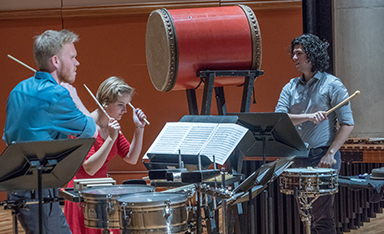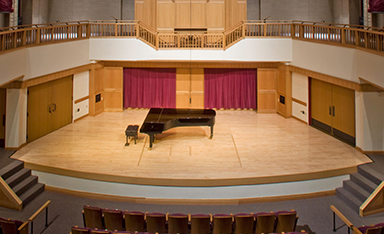Lamont piano students join a community dedicated to serious artistic commitment, where pianists are challenged to refine their craft in a focused and supportive environment. The department is vibrant and collaborative, where pianists challenge and support one another in pursuit of artistic excellence. Guided by Professors Stephanie Cheng, Steven Mayer, and Emily Book McGree, students engage in intensive private lessons, chamber music, performance class, large ensembles, and masterclasses with renowned guest artists. In Lamont’s piano department, students celebrate each other’s successes and push one another to reach new artistic heights.
25-30 piano students at Lamont
104 Steinway pianos in our building
300+ performance opportunities per year



Audition Repertoire Requirements
Undergraduate (BA, BM, minor)
-
In-Person Audition Requirements
All auditions are approximately 12 minutes in length. The applicant will choose one of their prepared works to perform. The faculty will choose the second of the prepared works and possibly an additional work as well.
Undergraduate (BM and BA-Applied Music)
Twenty minutes of repertoire to include three or four pieces, each from a different period listed below. Concertos are not accepted. Memorization optional.
- Baroque (e.g., two-part invention by Bach)
- Classical (e.g., Mozart, Haydn, Schubert*, Beethoven* Sonata – one movement)
- Romantic (e.g., Beethoven*, Schubert*, Schumann, Chopin, Brahms)
- Twentieth Century (e.g., Debussy, Ravel, Schönberg, Bartok, Hindemith)
Undergraduate (Minor)
- Ten minutes of repertoire consisting of two or more classical-genre pieces or movements
- All major scales, four octaves
- Memorization is not required
*Beethoven and Schubert straddled the Classical and Romantic periods. Therefore, it is acceptable to choose pieces by these composers to count for either period, depending on when the piece was written. For example, Schubert's Sonatas are considered Classical, while Beethoven's Diabelli Variations and Bagatelles would count as Romantic pieces.
Please do not select pieces by the same composer to cover both periods. For example, if you select an early work by Schubert for your Classical piece, do not also select a Schubert work for your Romantic piece.
-
Video Audition Requirements
Applicants unable to travel to Denver for a live audition may submit a video audition via the Lamont application. Repertoire may be recorded separately in multiple takes; editing within each take is prohibited.
Undergraduate (BM and BA-Applied Music)
Twenty minutes of repertoire to include three or four pieces, each from a different period listed below. Concertos are not accepted. Memorization optional.
- Baroque (e.g., two-part invention by Bach)
- Classical (e.g., Mozart, Haydn, Schubert*, Beethoven* Sonata – one movement)
- Romantic (e.g., Beethoven*, Schubert*, Schumann, Chopin, Brahms)
- Twentieth Century (e.g., Debussy, Ravel, Schönberg, Bartok, Hindemith)
Undergraduate (Minor)
- Ten minutes of repertoire consisting of two or more classical-genre pieces or movements
- All major scales, four octaves
- Memorization is not required
*Beethoven and Schubert straddled the Classical and Romantic periods. Therefore, it is acceptable to choose pieces by these composers to count for either period, depending on when the piece was written. For example, Schubert's Sonatas are considered Classical, while Beethoven's Diabelli Variations and Bagatelles would count as Romantic pieces.
Please do not select pieces by the same composer to cover both periods. For example, if you select an early work by Schubert for your Classical piece, do not also select a Schubert work for your Romantic piece.
Graduate (MM, certificate, pedagogy, AD)
-
In-Person Audition Requirements
All auditions are approximately 18 minutes in length. The applicant will choose one of their prepared works to perform. The faculty will choose the second of the prepared works and possibly an additional work as well.
Graduate (MM)
Applicants should prepare a solo recital program of at least 40 minutes of repertoire. Prelude & Fugue and sonata should be complete; concertos are not accepted. Memorization optional. Music selections should include:
- A major work from the Baroque period (e.g., Bach, Scarlatti, Rameau, etc.)
- A major work from the Classical period (e.g., Beethoven*, Schubert*, Haydn, Mozart, etc.)
- A major work from the Romantic period (e.g., Beethoven*, Schubert*, Chopin, Liszt, Brahms, Schumann, etc.)
- A major work from the 20th century, memorization optional (e.g., Bartok, Hindemith, Schönberg, Copland, Barber, Gottschalk, Beach, etc.)
*Beethoven and Schubert straddled the Classical and Romantic periods. Therefore, it is acceptable to choose pieces by these composers to count for either period, depending on when the piece was written. For example, Schubert's Sonatas are considered Classical, while Beethoven's Diabelli Variations and Bagatelles would count as Romantic pieces.
Please do not select pieces by the same composer to cover both periods. For example, if you select an early work by Schubert for your Classical piece, do not also select a Schubert work for your Romantic piece.
Graduate (certificate in performance)
Applicants should prepare at least 40 minutes of repertoire of the classical genre.
Pedagogy (Certificate)
- Twenty-five minutes of music consisting of two or more contrasting works or movements from any time period or combination of time periods. Repertoire selections are allowed from the same time period as long as the pieces demonstrate contrasting styles and are by different composers.
- A research paper related to music education/pedagogy (as per undergraduate work) or an article (1000-2000 words) related to the field
- A 20-minute video of teaching
- An interview with the piano pedagogy faculty
-
Video Audition Requirements
Applicants unable to travel to Denver for a live audition may submit a video audition via the Lamont application. Repertoire may be recorded separately in multiple takes; editing within each take is prohibited.
Graduate (MM)
Applicants should prepare a solo recital program of at least 40 minutes of repertoire. Prelude & Fugue and sonata should be complete; concertos are not accepted. Memorization optional. Music selections should include:
- A major work from the Baroque period (e.g., Bach, Scarlatti, Rameau, etc.)
- A major work from the Classical period (e.g., Beethoven*, Schubert*, Haydn, Mozart, etc.)
- A major work from the Romantic period (e.g., Beethoven*, Schubert*, Chopin, Liszt, Brahms, Schumann, etc.)
- A major work from the 20th century, memorization optional (e.g., Bartok, Hindemith, Schönberg, Copland, Barber, Gottschalk, Beach, etc.)
*Beethoven and Schubert straddled the Classical and Romantic periods. Therefore, it is acceptable to choose pieces by these composers to count for either period, depending on when the piece was written. For example, Schubert's Sonatas are considered Classical, while Beethoven's Diabelli Variations and Bagatelles would count as Romantic pieces.
Please do not select pieces by the same composer to cover both periods. For example, if you select an early work by Schubert for your Classical piece, do not also select a Schubert work for your Romantic piece.
Graduate (certificate in performance)
Applicants should prepare at least 40 minutes of repertoire of the classical genre.
Pedagogy (Certificate)
- Twenty-five minutes of music consisting of two or more contrasting works or movements from any time period or combination of time periods. Repertoire selections are allowed from the same time period as long as the pieces demonstrate contrasting styles and are by different composers.
- A research paper related to music education/pedagogy (as per undergraduate work) or an article (1000-2000 words) related to the field
- A 20-minute video of teaching
- Virtual applicants will also be scheduled for an interview with the piano pedagogy faculty
Review Requirements for Artist Diploma









